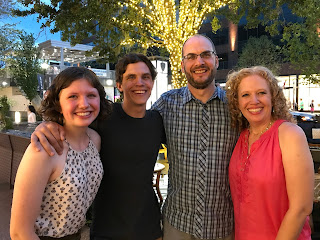Reading Notes: Jewish Fairy Tales, Part A
For this week's reading, I chose the unit on Jewish fairy tales. I really enjoyed seeing some more magical or fantastic details added to several Bible stories and characters I already knew. Below are some of my favorites from Unit A of the section:
The Giant of the Flood
I love that this story contains a unicorn and I love the fantastic elements included (the unicorn is as big as a mountain, precious stones compose the ark's windows, etc). I also enjoy how this story works littler explanatory myths in, like the phoenix origin story. This story is different for me because I know one version of it well, but it works in a character I know from different Bible stories, Og. I like how several of these Jewish fairy tales tie together common Bible stories and people to be part of one another's narratives (Og, for example, goes on to interact with Abraham and Moses later in his life in this telling).
From Shepherd-Boy to King
With this story, I'm also quite familiar with the Biblical figure of David, but this narrative takes it a step further. I like how the story really stays consistent to David's character — he definitely would have decided to stay on the magical mountain and thought "I wonder what will happen if I stay here?" I also appreciate that the story ties its elements to one of David's Psalms. However, I thought the story could be a little more well-rounded. The giant unicorn doesn't really seem to play much of a purpose and the story would make more sense without it, if David were to just encounter a lion.
The Water-Babe
This story is so interesting to me because even though I know quite a bit about Moses and his life, I'd never really thought about his infant years like this story does. Like I mentioned above, I enjoy how this story brings some more magical elements, like Reuel's staff, into play. I wish the story would have tied things together more thoroughly at the end and gone back to Bilam's prophecy about Moses' rebellion (I know Moses may not rebel against this pharaoh, but he does clash with a later pharaoh and bring down part of his kingdom). I also enjoyed that Moses was given so much character and promise even at three years old — much like David in the next story, the character here is consistent with the stories I know and the men portrayed in them.
Bibliography: Gertrude Landa, Jewish Fairy Tales and Legends (1919)
The Giant of the Flood
I love that this story contains a unicorn and I love the fantastic elements included (the unicorn is as big as a mountain, precious stones compose the ark's windows, etc). I also enjoy how this story works littler explanatory myths in, like the phoenix origin story. This story is different for me because I know one version of it well, but it works in a character I know from different Bible stories, Og. I like how several of these Jewish fairy tales tie together common Bible stories and people to be part of one another's narratives (Og, for example, goes on to interact with Abraham and Moses later in his life in this telling).
 |
| David rides a deer to flee the lion. Image courtesy of Laura Gibbs. Source: UnTextbook. |
From Shepherd-Boy to King
With this story, I'm also quite familiar with the Biblical figure of David, but this narrative takes it a step further. I like how the story really stays consistent to David's character — he definitely would have decided to stay on the magical mountain and thought "I wonder what will happen if I stay here?" I also appreciate that the story ties its elements to one of David's Psalms. However, I thought the story could be a little more well-rounded. The giant unicorn doesn't really seem to play much of a purpose and the story would make more sense without it, if David were to just encounter a lion.
The Water-Babe
This story is so interesting to me because even though I know quite a bit about Moses and his life, I'd never really thought about his infant years like this story does. Like I mentioned above, I enjoy how this story brings some more magical elements, like Reuel's staff, into play. I wish the story would have tied things together more thoroughly at the end and gone back to Bilam's prophecy about Moses' rebellion (I know Moses may not rebel against this pharaoh, but he does clash with a later pharaoh and bring down part of his kingdom). I also enjoyed that Moses was given so much character and promise even at three years old — much like David in the next story, the character here is consistent with the stories I know and the men portrayed in them.
Bibliography: Gertrude Landa, Jewish Fairy Tales and Legends (1919)


Comments
Post a Comment